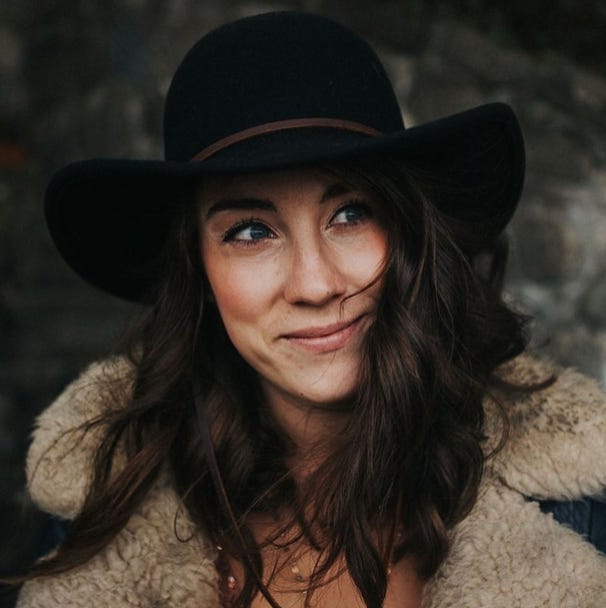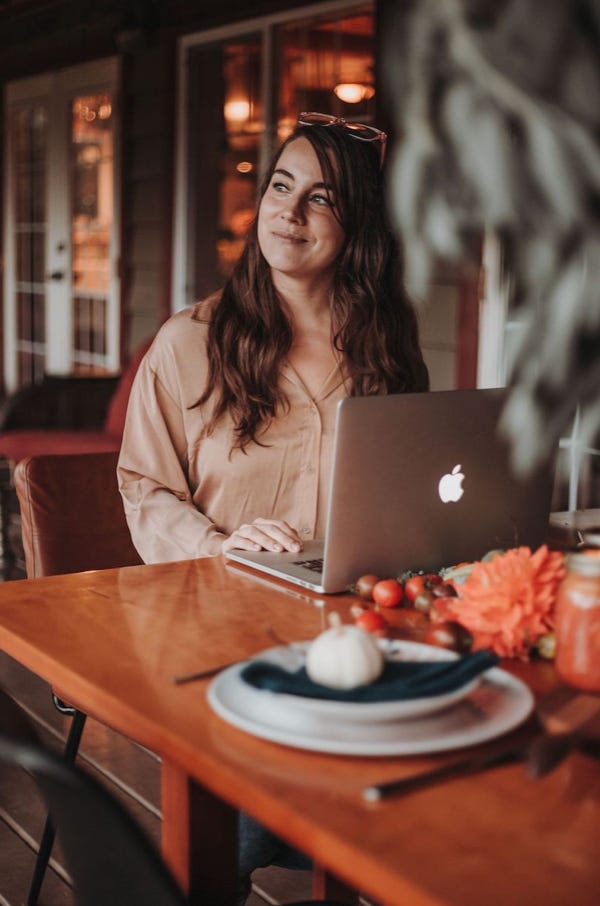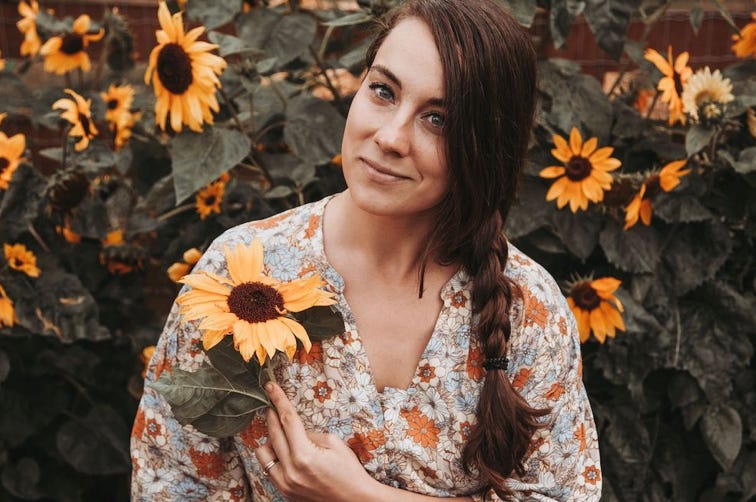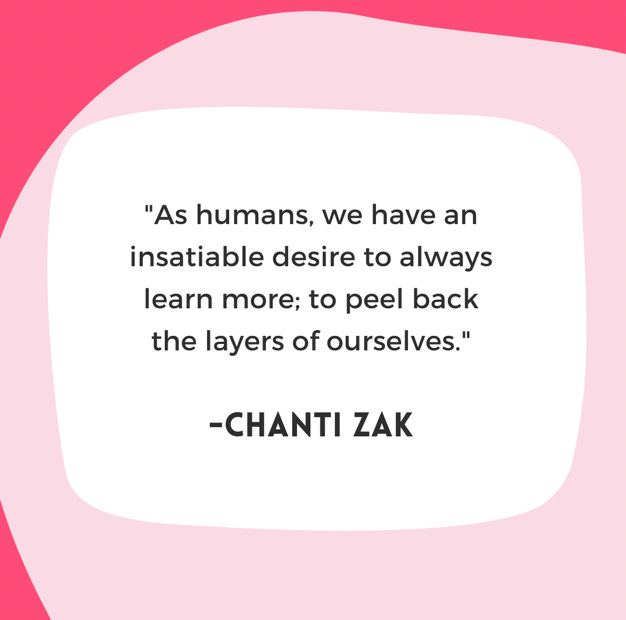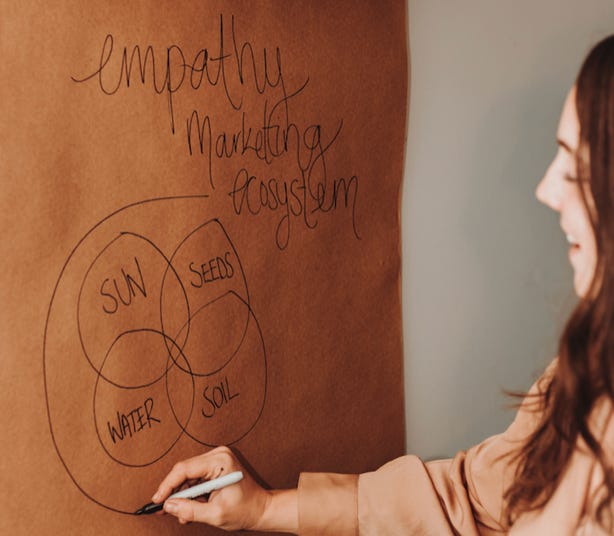Hello, hello!
For this month’s Tuesday Tapestry interview, I had the privilege of chatting with quiz funnel strategist, growth consultant, and coach, Chanti Zak.
Chanti has a truly remarkable story. She went from working a minimum wage job to becoming a thriving, empathy-driven entrepreneur who helps multi-million dollar companies grow their businesses. In the past several years, Chanti has generated over half a million dollars in course sales and has amassed an impressive clientele list including Amy Porterfield, Jenna Kutcher, and Rick Mulready. However, Chanti didn't enter the space with a marketing or business background — in fact, she barely completed high school.
So, how did Chanti become the successful business owner she is today?
In this interview, she’ll walk us through her journey, as well as the three strategies that have helped her the most. Let’s dive in!
Brina: Let’s first chat briefly about your background. How did you break into freelance copywriting, and what led you to becoming the quiz funnel expert you are today?
Chanti: I was working at a minimum wage job, which I loved. I love cooking and being around people and it was a lot of fun. But then I unexpectedly got pregnant with my first child and realized that the chef life was not gonna fly.
So, I tried to make money online through food blogging. That was my attempt at funding my maternity leave and transitioning out of the work I was doing.
I had no idea what freelance writing even was at the time. And I didn't understand anything about copywriting or online marketing. I saw one successful food blog that would publish their income reports and they were making $30,000 a month.
At the time, that was an unfathomable amount of money to me — I didn't have any idea that you could make money posting recipes and taking beautiful photos. So that was my goal — not to make $30,000 a month, but even three or four would've been absolutely life-changing.
I got a loan and was able to get a decent laptop. Through YouTube and free resources, I learned how to build a website and take decent photos. I did that for six months and really tried to build that up. To a degree, it was pretty successful for someone who had no idea what they were doing.
But I quickly realized, “I'm not gonna make anywhere near the amount of money I would need to be able to not go back to work.”
Someone had approached me and asked if I'd be open to writing content for their food blog/wellness website. I started doing that for very, very low pay — I’d charge $50 for a 2,000-word article. It would take me hours to research it and put it all together, but I still thought that was absolutely amazing.
I did that for a while. A few months later, I discovered copywriting — this other type of writing that people perceived to be much more valuable than the content writing I was doing.
My son was a little over a year old when I started getting into copywriting and studying it. I was still working a different minimum wage job at night, and during the day, I’d build my copywriting business.
Health and wellness was my niche for a while, but it was still pretty broad. I’d do everything under the sun — writing blog posts on different types of foot fungus to website copy for a health coach to recipe development — and still really undercharge.
I was starting to make a few thousand dollars a month, so it was like, “Okay, there's something here. There's something that's working.” That led me to going all in on freelancing and quitting the restaurant job.
At that point, there was the issue of rollercoaster revenue, which I think is so typical of freelance life. I didn't know if I'd be able to pay the bills from one month to the next. When the opportunity came to get a full-time copywriting position with a company, I was all over it.
I talked my way into getting that job — I don't have any university or college education or any marketing or journalism degrees. They wanted that, but I was like, “Listen you guys, I don't need that. I can do this job. Give me a chance.”
They hired me! So I then became the in-house copywriter for a spiritual development company that was selling courses, retreats, and one-on-one coaching. I was writing the course content and curriculums, developing the whole sales funnel, all the lead magnets, all the emails, everything.
That’s where I created my first quiz, which was a real success for them — it worked better than any lead magnet they'd ever tried in the past. I knew I was onto something.
I worked there for about a year, and then I was let go. At this point, all of my time and energy was going toward my full-time job. I didn't have other clients on the side. So suddenly I was like, “Oh my God. I have to start from scratch basically.”
It felt terrifying at the time, but I knew I had this great case study by doing the quiz for the company. I didn’t know if it would work in other industries with other types of businesses, but I wanted to use it to get on podcasts and land new clients.
I had to replace [my previous] income because by that point, my husband was taking care of our little one and I was the sole breadwinner.
From there, the rest is history — it did work for other types of businesses. That case study got me onto some big podcasts, which then led to more clients, with the podcasts hosts often hiring me themselves.
Brina: I love that. I think your story is so relatable because a lot of us who enter copywriting or writing-related professions don't have a background in them.
Now, let’s focus specifically on quiz funnels themselves. Why are quiz funnels such an effective marketing strategy? And what are the components of an effective quiz funnel?
Chanti: I think what makes them so popular and effective is the focus on your audience's favorite topic, which is themselves. As marketers, we're trained to ask this question that our readers or potential customers are asking, which is: “What's in it for me?”
With the quiz, it's obvious what's in it for the quiz taker. They get to learn more about themselves, their circumstances, where they might be falling short, what they're good at, their natural strengths, their challenges, how to overcome them.
That can land anywhere on a spectrum from pure fluff, like “Which Harry Potter house do you belong to?” to more serious assessment-style quizzes such as “How is your mental health impacting your parenting?” So, it can be anywhere along that spectrum, but it doesn't really matter at the end of the day — it's about who we are.
As humans, we have an insatiable desire to always learn more; to peel back the layers of ourselves. We're always changing, so there's always fresh insight and new ways to grow or evolve. A quiz can reveal that for people.
What tends to work the best is if you can intertwine the angle of your quiz with the personal characteristics of the person that you're trying to reach. Ideally, you're speaking to the positive attributes of the person who's taking the quiz and making them feel good about themselves; like they're in the right place and you get them and see them. That's where the magic happens.
Brina: Yeah, I like that. As you said, it taps into our need for curiosity and validation.
I want to pivot now to the three strategies you used to grow your own business. Let’s talk about the first strategy: getting on top-rated podcasts, such as Entrepreneurs on Fire and Online Marketing Made Easy. Do you have a pitching strategy or do you get invited as a guest? Or a mix of the two?
Chanti: At this point in my career, it's a bit of a mix. In my early days, I was purely the one doing the pitching.
I’d make a list of all the shows that accept guests and that are pretty popular and relevant to the type of person I want to work with. I was doing one pitch a day — my approach is quality over quantity. One pitch a day sounds like nothing to someone whose main strategy is sending out cold pitches all day using a template that only 1% of people respond to. We all get those emails. But no one likes those emails.
So I wanted to put the time, energy, and research into getting this right. Cold pitching is a very uncomfortable thing to do, especially as someone who's pretty introverted.
I knew I’d have to do this in a way that felt caring and thoughtful. I’d listen to at least one episode of the podcast that I was pitching and do a little bit of research into what the host was up to — what's been happening in their world recently — by looking at their socials and stuff like that.
By being up-to-date, in the pitch I could mention, “Hey, I really liked this recent episode you did with so-and-so,” or, “I noticed on your Instagram that you just got married. Congrats!” Basically, I wanted to show that I’m not a random spammer; that I know who they are, truly care, and want to be on their show.
From there, it was all about — again — that question: “What's in it for me?” But this time, I’d ask it from the perspective of a podcast host. I have my own podcast now, and often you get pitches and they’re all about the other person.
My approach is to list out a bunch of ideas for things I can talk about that are relevant to the podcast audience. This means having a good sense of the listenership. I’d then offer a few title ideas, too, and really try to make it as easy as possible for someone to say yes.
So, that worked pretty darn well. Even when I got “no”s, they were like, “We're not taking guests right now, but this is one of the best podcast pitches we've ever gotten.”
I got on Entrepreneurs on Fire and Rick Mulready’s podcast really early on in my career. Both of them ended up hiring me to work with them on quizzes. So it's funny because it's not just the people listening to the podcast that were then following up.
Brina: Right. It opens another door in that aspect, as well. I like your approach. I mean, being intentional and bringing value is so important.
Okay, now moving onto your own quiz funnel. What does it focus on and what benefits has it brought for your business?
Chanti: It's very meta because it's a quiz that tells you what type of quiz you should create.
That's a big question that people would ask me, and there are different approaches and strategies based on your goals; what type of business you have.
So that's the quiz I put together. It tells me a lot about who's coming onto my email list.
I ask questions like, “Are you a course creator? Are you a service provider? Are you a coach? Are you in e-commerce?” I also ask questions like, “How long have you been in business? What are your current lead generation strategies?” These are all really useful insights for me to have. From there, the results say, “Here's what type of quiz could work for you. Here's how you can start to do this for yourself.”
I don't even talk about hiring me in this result. It's all value first — shining a light on my expertise, but how it can benefit them. I've used that quiz in a number of ways, but the primary one is to get students who are interested in learning how to do this quiz funnel with me in the different courses that I offer.
They get this first touchpoint that's really easy to say yes to — taking a quiz. Then they're on my email list. Then I can follow up with them, establish more of a rapport, share more about who I am, share some different success stories, and discuss different ideas that build on what I taught them in the quiz results. Ideally, by the time I say, “Hey, I have this training coming up that'll help you do this step by step,” a percentage of them are like, “Absolutely! I'm ready.”
It's quite a natural segue into working with me as a teacher or coach, but then a percentage of the people who come through that way are like, “I don't wanna do this for myself. This is really great and you've sold me on the idea, but is there a way that you could do it for me? Can I hire you?”
So that naturally happens, too. For the most part, it's a strategy for more scalable income that's not tied to me trading time for money.
Brina: Right. That's the ultimate goal. It’s super clever how you designed a quiz based on quiz funnels. Now that I think about it, that's probably what I would want to know!
Let’s talk about your third strategy now. You said that many freelancers don’t focus enough on their personal brand. Why do you think that is?
Chanti: I think most freelancers dramatically undercharge, just as I did for a long time. You don't have time to work on your personal brand because you’re swamped. For example, a client sees that you're only charging $25 an hour for — let's say, editing — when you should be charging $75. They're gonna take advantage of that a thousand percent.
So yes, you'll quickly be fully booked out. But you'll also be on the fast track to burnout and unable to carve out any time to build a brand that would then allow you to charge even more premium prices and position you as the go-to expert in X, Y, Z. You just don't have time to do that.
It's often really common that even expert copywriters don't have the capacity to write the copy for their own websites. I've been guilty of this. I don't think I undercharge anymore, but it still happens where you just get so swamped.
Brina: That's a really good point. I think it’s a scarcity mindset issue where, yeah, it’s easy to lose sight of the bigger picture. I’m realizing how important it is to put the upfront work into your personal brand. It’s not an immediate payoff.
Chanti: Right. It’s not immediate, and you don't necessarily know if it's working. Another challenge is wondering, “Is it worth it? Should I really be consistent with building an email list and all of that?”
It does kind of require having a long-term vision. I have three kids now and every child has brought a new push into whatever's next, which feels challenging and exciting at the same time. My first goal was to just replace my income and not have to work in restaurants anymore. Then it was, “Okay, maybe I can move from content writing to copywriting and make even better money, like $5K a month.”
After that, “Now I've got a full-time job. Cool. I'm making a steady salary — that's great.” It kept snowballing, and now it’s, “How can I leverage the skillset that I've developed to do for myself what I do for clients, which is building these journeys that allow you to stop relying on trading time for money?” And also help more people, as well. So yeah, that's the ongoing vision, but it's hard to connect to that when you're just scraping by.
Brina: Oh, for sure. I wanted to ask one last question before we wrap things up. What are your biggest sources of creative inspiration?
Chanti: Right now, my greatest source of creative inspiration is nature. I bought a seven-acre homestead a few years ago and have been learning how to grow food and garden. I was raised in suburbia eating all the processed food, and didn't even know what kale was until I was 25! This is so new to me.
It’s fascinating how many parallels there are in nature and also trying to purposefully cultivate something within nature. It’s wild — nature doesn't want to be cultivated! The weeds want to be there. The animals want to come and eat your food.
So, there's a lot there that I find parallels creativity and business. My favorite thing is to try and spend at least an hour a day outside in the garden or just go for a walk with my kids and witness the miracle of life around us and how resilient nature is.
Bio: Chanti Zak is the creator of The Empathy Marketing Ecosystem. She's a quiz funnel strategist, growth consultant, and coach that’s obsessed with psychology, interactive marketing, and getting brag-worthy results for her students and clients. She believes boring is the enemy, neutral is a death sentence, and real talk is the way of the future. In her spare time you can find her hanging with her 3 kiddos, learning how to homestead, or binge-watching Chef’s Table. Learn more about Chanti on her website http://chantizak.com.




